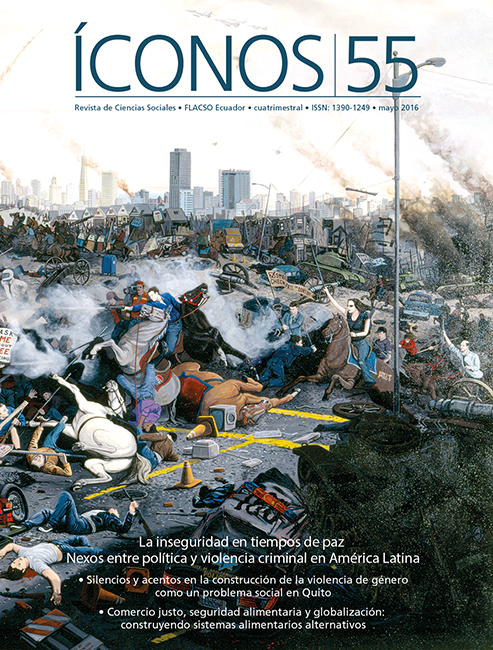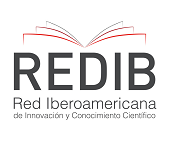Ordens criminal-legais: repensando o poder político do crime organizado
Resumo
Apesar da sua relevância para entender a mudança política e a instabilidade em muitas partes do sul global, a relação entre o crime organizado e as ordens políticas continua sem ser estudada a fundo. Este artigo introduz o inovador conceito de “crimilegalidade” para abordar este assunto. Recorrendo às concepções de ordem política elaboradas por Weber, Fukuyama e North, Wallis e Weingast, explica-se como os patrões regulares de intercâmbio e interação social –entre atores privados e públicos, e estatais e não-estatais que se estende sobre a brecha que comumente divide ao âmbito da legalidade (“mundo legítimo”) do âmbito da criminalidade (“submundo ilegítimo)– influem no caráter, na forma e na evolução da ordem política. Sugere-se que nas ordens crimilegais onde a criminalidade organizada adquire maior poder político e que os oligopólios da coerção e violência são elementos constitutivos de tais ordens. Este artigo conclui com algumas ideias acerca de como o conceito de crimilegalidade pode ser adotado de maneira útil nos âmbitos da construção da paz e na mitigação da violência não associada aos conflitos armados na América Latina e em outras partes do mundo contemporâneo.
Downloads
Referências
Allum, Felia y Stan Gilmour. 2012. “Introduction”. En The Routledge Handbook on Transnational Organized Crime, editado por Felia Allum y Stan Gilmour, 1-16. Londres y Nueva York: Routledge.
Arias, Desmond. 2006. “The Dynamics of Criminal Governance: Networks and Social Order in Rio de Janeiro”. Journal of Latin American Studies 38: 293-325.
Banco Mundial. 2011. World Development Report 2011. Washington DC: Banco Mundial.
Bayart, Jean-Francois, Stephen Ellis y Beatrice Hibou. 1999. The Criminalization of the State in Africa. Bloomington Indiana: Indiana University Press.
Benjamin, Walter. 1996. Walter Benjamin: Selected Writings, Volume 1: 1913-1926. Cambridge, Massachusetts: Harvard University Press.
Casas-Zamora, Kevin, ed. 2013. Dangerous Liaisons. Organized Crime and Political Finance in Latin America and Beyond. Washington DC: Brookings Institution Press.
Chambliss, William. 1989. “State-Organized Crime”. Criminology 27 (2): 183-208.
Cockayne, James. 2013. “Chasing Shadows”. The RUSI Journal 158 (2): 10-24.
Costa, Antonio. 2010. “The Economics of Crime: A Discipline to be Invented and a Nobel Prize to be Awarded”. Journal of Policy Modeling 32: 648-661.
Della Porta, Donatella. 2012. “Foreword”. En The Routledge Handbook of Transnational Organized Crime, editado por Felia Allum y Stan Gilmour, xiii-xiv. Londres y Nueva York: Routledge.
Dirlik, Arif. 2007. “Global South: Predicament and Promise”. The Global South 1: 12-23.
Duncan, Gustavo. 2014a. “Drug Trafficking and Political Power: Oligopolies of Coercion in Colombia and Mexico”. Latin American Perspectives 195 (2): 18-42.
______. 2014b. Más que plata o plomo. El poder político del narcotráfico en Colombia y México. Bogotá: Penguin Random House Grupo Editorial.
Duyne, Petrus, Klaus von Lampe y Nikos Passas, eds. 2002. Upperworld and Underworld in Cross-Border Crime. Nijmegen: Wolf Legal Publishers.
Edwards, Adam y Michael Levi. 2008. “Researching the Organization of Serious Crime”. Criminology and Criminal Justice 8 (4): 363-388.
Edwards, Adam y Peter Gill, eds. 2003. Transnational Organized Crime. Perspectives on Global Security. Londres y Nueva York: Routledge.
Felson, Marcus. 2006. “The Ecosystem of Organized Crime”. Ponencia presentada en HEUNI 25th Anniversary Lecture, Helsinki Institute for Crime Prevention and Control, Helsinki, 5 de octubre.
Fiorentini, Gianluca y Sam Peltzman, eds. 1995. The Economics of Organized Crime. Cambridge: Cambridge University Press.
Fukuyama, Francis. 2014. Political Order and Political Decay. From the Industrial Revolution to the Globalization of Democracy. Londres: Profile Books.
______. 2011. The Origins of Political Order. From Prehuman Times to the French Revolution. Londres: Profile Books.
Galeotti, Mark. 2005. Global Crime Today. The Changing Face of Organized Crime. Londres: Routledge.
Gambetta, Diego. 1996. The Sicilian Mafia: the Business of Private Protection. Cambridge, Massachusetts: Harvard University Press.
Garay-Salamanca, Luis y Eduardo Salcedo-Albarán. 2012. “Institutional Impact of Criminal Networks in Colombia and Mexico”. Crime, Law & Social Change 57: 177-194.
Godson, Roy. 2007. “Crisis of Governance: Devising Strategy to Counter International Organized Crime”. Terrorism and Political Violence 6 (2): 163-177.
González G., Fernán. 2014. Poder y violencia en Colombia. Bogotá: ODECOFI / CINEP.
Heine, Jorge y Ramesh Thakur, eds. 2011. The Dark Side of Globalization. Nueva York: United Nations University Press.
International Crisis Group. 2010. “Guatemala: Squeezed between Crime and Impunity”. Latin America/Caribbean Report 33. Bogotá / Bruselas, 22 de junio.
______. 2009. “Uribe’s Possible Third Term and Conflict Resolution in Colombia”. Latin America Report 31. Bogotá / Bruselas, 18 de diciembre.
Kaldor, Mary. 2012. New and Old Wars. Organized Violence in a Global Era. Cambridge: Polity.
Kemp, Walter, Mark Shaw y Arthur Boutellis. 2013. The Elephant in the Room: How Can Peace Operations Deal with Organized Crime? Nueva York: International Peace Institute.
Levi, Michael. 2014. “Thinking about Organized Crime”. The RUSI Journal 159 (1): 6-14.
López, Alfred. 2007. “Introduction: the (Post) Global South”. The Global South 1 (1): 1-11.
López H., Claudia. 2010. “La “refundación de la patria”, de la teoría a la evidencia”. En Y refundaron la patria… de cómo mafiosos y políticos reconfiguraron el Estado colombiano, editado por Claudia López H., 29-78. Bogotá: Debate.
Lupsha, Peter. 1996. “Transnational Organized Crime versus the Nation-State”. Transnational Organized Crime 2 (1): 21-48.
McCarthy, Dennis. 2011. An Economic History of Organized Crime. Londres: Routledge.
Naím, Moisés. 2012. “Mafia States”. Foreign Affairs 91 (3): 100-111.
Naylor, Thomas. 1995. “From Cold War to Crime War: The Search for a New ‘National Security’ Threat”. Transnational Organized Crime 1 (4): 37-56.
Neumann, Peter. 2007. “Negotiating with Terrorists”. Foreign Affairs 86 (1): 128-138.
North, Douglass, John Wallis y Barry Weingast. 2009. Violence and Social Orders. Cambridge: Cambridge University Press.
Paoli, Letizia. 2005. “Italian Organized Crime: Mafia Associations and Criminal Enterprises”. Global Crime 6 (1): 19-31.
Reno, William. 2009. “Illicit Commerce in Peripheral States”. En Crime and the Global Political Economy, editado por Richard Friman, 67-84. Londres: Lynne Rienner.
Risse, Thomas. 2011. “Governance in Areas of Limited Statehood: Introduction and Overview”. En Governance without a State? Policies and Politics in Areas of Limited Statehood, editado por Thomas Risse, 1-38, Nueva York: Columbia University Press.
Ruggiero, Vincenzo y Mark Welch. 2009. “Power Crime”. Crime, Law and Social Change 51 (3-4): 297-301.
Schultze-Kraft, Markus. 2014. “Getting Real About an Illicit “External Stressor”: Transnational Cocaine Trafficking through West Africa”. IDS Evidence Report 72. Brighton: Institute of Development Studies.
______. 2013a. “’External Stresses and Violence Mitigation in Fragile Contexts: Setting the Stage for Policy Analysis”. IDS Evidence Report 36. Brighton: Institute of Development Studies.
______. 2013b. “Nigeria’s Post-1999 Political Settlement and Violence Mitigation in the Niger Delta”. IDS Evidence Report 5. Brighton: Institute of Development Studies.
______. 2012. “Security and the Rule of Law in Colombia and Guatemala: Priorities, Trade-Offs and Interdependencies”. Hague Journal on the Rule of Law 4: 135-157.
______. 2005. Pacificación y poder civil. Las relaciones cívico-militares en El Salvador, Guatemala y Nicaragua en el posconflicto. Bogotá: Norma.
Schultze-Kraft, Markus y Engjellushe Morina. 2014. “Decentralization and Accountability in War-to-Peace Transitions: The Case of Kosovo”. IDS Bulletin 45: 92-104.
Schultze-Kraft, Markus y Scott Hinkle. 2014. “Toward Effective Violence Mitigation: Transforming Political Settlements”. IDS Evidence Report 101. Brighton: Institute of Development Studies.
Shelley, Louise. 1995. “Transnational Organized Crime: an Imminent Threat to the Nation-State?” Journal of International Affairs 48 (2): 463-489.
Skaperdas, Stergios. 2001. “The Political Economy of Organized Crime: Providing Protection Where the State Does Not”. Economics of Governance 2 (3): 173-202.
Slater, Dan. 2010. Ordering Power. Contentious Politics and Authoritarian Leviathans in Southeast Asia. Nueva York: Cambridge University Press.
Smith, Dwight. 1980. “Paragons, Pariahs, and Pirates. A Spectrum-Based Theory of Enterprise”. Crime & Delinquency 26 (julio): 358-386.
Spector, Bertram. 2004. “Negotiating with Villains Revisited: Research Note”. International Negotiation 8: 613-621.
United Nations Office on Drugs anda Crimen (UNODC). 2010. Crime and Instability: Case Studies of Transnational Threats. Viena: UNODC.
______. 2005. Transnational Organized Crime in the West African Region. Viena: UNODC.
______. 2004. Convención de las Naciones Unidas contra la Delincuencia Organizada Transnacional. Nueva York: Naciones Unidas.
Vander Beken, Tom. 2012. “The Many Faces of Organized Crime in Europe, and its Assessment”. En The Routledge Handbook of Transnational Organized Crime, editado por Felia Allum y Stan Gilmour, 83-96. Londres y Nueva York: Routledge.
Von Lampe, Klaus. 2001. “Not a Process of Enlightenment: The Conceptual History of Organized Crime in Germany and the United States of America”. Forum on Crime and Society 1 (2): 99-116.
Weber, Max. 1978. Economy and Society, editado por Guenther Roth y Claus Wittich. Berkley. Los Ángeles y Londres: University of California Press.
______. 1946. “Politics as a Vocation”. En Essays in Sociology, editado por Hans Heinrich Gerth y Charles Wright Mills, 26-45. Nueva York: Macmillan.
Wennmann, Achim. 2014. “Negotiated Exits from Organized Crime? Building Peace in Conflict and Crime-affected Contexts”. Negotiation Journal 30 (3) (junio): 255-273.
Williams, Phil y Gregory Baudin-O’Hayon. 2002. “Global Governance, Transnational Organized Crime and Money Laundering”. En Governing Globalization, editado por Anthony McGrew y David Held, 127-144. Cambridge, UK: Polity Press.
Wilson, Eric. 2009. “Deconstructing the Shadows.” En Government of the Shadows: Parapolitics and Criminal Sovereignty, editado por Eric Wilson, 13-55. Londres: Pluto Press.

Íconos - Revista de Ciencias Sociales bajo licencia Creative Commons Reconocimiento-SinObraDerivada 3.0 Unported License.














